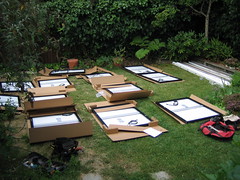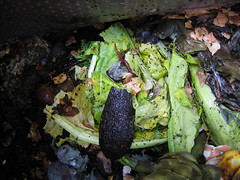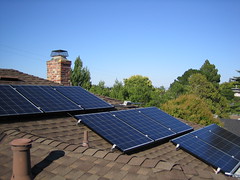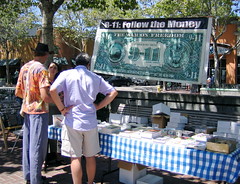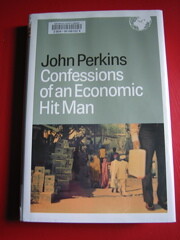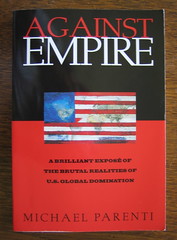Catherine and Amanda Go Solar
In this summer of national self reflection on just what noble cause our soldiers are dying for in Iraq, a little counter celebration is in order as I listen to workmen on our roof. Look at all those panels. Laid out like that they were nearly as large as the lawn.
Solar Power, that Holy Grail of eco living has long been a dream that I was willing to finance, but not owning a house it remained a dream. Catherine who has been a homeowner for twelve years (a legacy of her marriage), had heard the call of solar too, but being a homeowner, any extra money was earmarked for more pressing projects like replacing the roof. By the time the two of us got it together, installing solar panels became a significant milestone to celebrate in our journey to partnership.
Eleven years ago when I accepted Catherine's invitation to move into her house, I couldn't believe I was going to live in a house with a leather couch. And a beige one at that. How yuppifyied could you get? Having never considered becoming a homeowner, I had spent my adult life living in shared rental housing. This usually meant an eclectic assortment of furnishings. The shabbiness of the couch being a measure of the occupants' priorities or lack thereof.
I asked Catherine if I could bring my worm bin with me. She hadn't heard of worm composting. She just thought I was eccentric. It was a testament to her love that she allowed me to set up my homemade plywood box, occupied by several pounds of earthworms, in the coolness of the half basement. I tenderly introduced her to my worm friends. (In this household of purebred animals - a Manchester terrier and a ball fetching, Abyssinian cat, it amused me to refer to the worms as my pets.)
The first five years I spent gardening, replacing a third of the lawn with paving stones and drought tolerant perennial beds. I bought a push mower and installed drip irrigation. Catherine took care of the front yard and we argued about what plants were tidy enough for curbside appeal.
Our first mutual commitment to eco living was toilet paper (80% post-consumer recycled content) and compact fluorescent light bulbs where I could stand them. (The color didn't look right in the lampshades). Meanwhile Catherine began buying organic food because she didn't want us to be poisoned by pesticides and didn't trust genetically modified foods. This was a luxury I didn't feel I could afford, but as I realized the connection between what we ate and the health of the soil, I resigned myself to the high prices. To compensate I stepped up my vegetable growing and joined an organic gardening group.
After six years of living together, we felt we had enough of a commitment to last the life of an appliance, so we bought an energy star refrigerator and a dishwasher together. Catherine had the house painted, put in double paned windows and had the floors refinished. Still we kept our money separate. I was in the stock market on a tear to make my fortune.
When I emerged from the bust, financially battered, demoralized and unnerved, my perspective was significantly altered. Having a long-term relationship took on much greater significance. We decided to take the next step - sign the papers that would insure I would not have to think about being tossed out of the house should Catherine expire suddenly. ("Sounds like I'm a tub of cottage cheese", she comments.)
It turned out this potential expulsion had affected me much more than I realized. The house never really felt like my home until we signed those papers. Only then did I started thinking like a homeowner, thinking solar and water catchment systems, on demand hot water heating and building more than just a garden trellis.
This spring when Catherine asked if she could turn the compost heap, I realized we had arrived. When she declared, after watching a documentary on factory farming, that she was becoming a vegetarian, I was alarmed.
"What," I asked pragmatically, "are we going to do with all this chicken in the freezer?"
"Feed it to Tango," she said. Well if we were going to feed it to the cat, I could eat some of it too. We compromised. Mostly we would be vegetarian and once in a while Tango and I would treat ourselves to free range chicken.
We were serious now. Together we had looked at what was happening to the environment, how global warming was affecting the oceans, what it would take to stop the process.
When Jared Diamond, in his book Collapse, asked what was going on in the mind of the Easter Island inhabitant who cut down the last tree, he was asking us what is going on in our minds as news of the planet's demise keeps surfacing and global oil supply approaches its peak. Why are we continuing to drive ever bigger cars, build bigger houses, remodel our kitchens with banks of 8 lights where there was one before and plugging in more instant on appliances with their phantom loads?
The government isn't addressing global warming, let alone peak oil and the media continues to treat the subject as not happening. What if those luckless Easter Island inhabitants didn't know it was the last tree? Perhaps those in power convinced them there was plenty more on a just-out-of-reach, we'll-go-there-someday island or that the great gods they were building statues for would finally provide. This would not be us, but we were bucking the everything-will-work-out optimism of American culture.
Some how people were concerned, but just not concerned enough. Why were we different? Why did we insist on delving into the depressing news of big fish and plankton dying off, permafrost melting, plastic molecules contaminating the oceans, when even environmental organizations don't go there really? (Whether out of fear of paralyzing their supporters or of alienating potential business allies, this may be the undoing of the movement.)
Because, I realized, if we don't fathom the problem, we won't know how great our commitment and our effort needs to be to overcome it. From what I was reading, we would need every effort from all of us. Maybe some would be overwhelmed by the dire news and become paralyzed or start hoarding and panicking, but most had not been asked, not been motivated to rise to the challenge.
Lacking this rising of the populace to make change, it became for us a moral issue really. We would not go to our graves knowing that we simply shrugged and said what could we do, the problem was too overwhelming.
If cutting our emissions by 70% in order to halt the warming process was what was required then we needed to at least try. We would be the first on our block. It would not surprise any of our neighbors after seeing the Sparrow (still in the shop, alas, awaiting parts if indeed said parts are still made).
Once I bought the electric car, solar was the obvious next step. No more would naysayers be able to point out that I was still polluting because I was plugging into a dirty grid. Though they would try to say that the making of solar panels cost more energy to make than would ever be generated over the life of the panel. That bit of misinformation seems to have lodged itself into the smarty-pants noggins of pro-nuke sorts and the occasional MBA. Perhaps it was an attempt to explain why solar was impractical in a market economy while not admitting that it wasn't a level playing field.
I asked our installer about the embedded energy in the solar panels. It takes two years for the panels to generate the power it took to make them, he admitted. That wasn't so bad. (For you doubting Thomases here are charts and graphs and everything from the energy dapartment.) We were also pleased to learn that it wouldn't cost as much as we expected. Catherine was thinking $20,000, but because our power need was half what our installer would have guessed, given the size of the house we would only need a 1.6 kilowatt system - 12 panels.
After the various rebates and tax deductions it came out to just under $12,000 with the electrician's fee added. Solar was definitely a serious commitment to our principles, but the satisfying part would come from selling power to PG & E at peak rates, 31 cents a Kwh in the summer, then buying it back in the evening and morning at 8 cents a Kwh when we use most of our power. Plus we would have that thrill of watching the meter run backward.
California representatives continue to push through legislation to boost support for solar. The Million Solar Home bill that Schwarzenegger is so proud of is being discussed in the Assembly Appropriations Committee next week. The Senate already passed it 30 votes to 5. If passed the bill would not only continue the rebates and tax credits, but also require homebuilders to offer a solar option on every large single family home built, with the cost integrated into the mortgage. This would save on cost of installation and push down prices as demand rose.
Originally the bill was going to require that every new home be outfitted with solar, but this was considered too much of a boon to the solar industry (as if the oil and gas industry didn't already have a leg up from government subsidies). By 2018 if the million solar homes goal is met, 3,000 megawatts of solar energy would be generated. Enough to provide all the peak energy needs of 750,000 homes (or a city the size of San Francisco). Go California.
We had accepted that there would be little federal government leadership in the direction of building renewable energy until it was too late. All the more reason to proceed locally.
"We have to be our own leaders," I had said to Catherine. "No one else is going to do it."
Thus we had both applied for and were accepted into a year long program called Be The Change sponsored by Acterra, formerly the Peninsula Conservation Center merged with Bay Area Action. Catherine was also spearheading a new chapter of the Buddhist Peace Fellowship at our meditation center, while I was working with a colleague on a workshop to teach organizers how to counter afluenza (habitual shopping beyond need) in their clients.
With both of us driven like this, we would feed each other, strengthen our relationship at the same time and keep despair away. That in itself was a powerful way to live (and love).
"What do you think of visiting Hiroshima?" Catherine asked me, eager to delve into our nations shame.
"I think Spain would be more fun," I said thinking, of Gaudi, Barcelona and sunny public squares.
Published concurrently at the energy bulletin.
